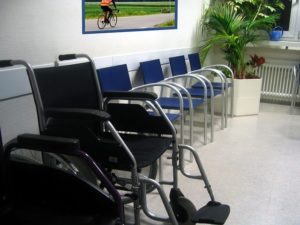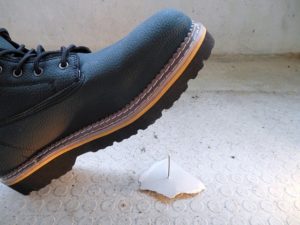
Accidents at Work in Vermont
What Is Considered a Workplace Injury?
Any time an employee suffers an injury or illness “arising out of” and “in the course of” work, it is considered a workplace injury. Basically, this means if a worker gets hurt at work it is a workplace injury. Sometimes classifying an injury as a work-related injury is simple.
For example, an employee is stocking shelves and falls off the step stool and breaks an ankle. Here it is simple to see that the employee was hurt at work, causing a broken ankle.
Does Workers Compensation Cover Illnesses?

Yes. Just like any physical injury, workers’ compensation does cover illness and diseases that are caused by work. In determining whether an illness or disease would be covered under workers’ compensation, an injured worker must have a medical opinion, from a doctor, stating that illness or disease was more likely than not to be caused by work, and explaining how the work caused the illness or disease.
These types of claims can be harder to prove because the relationship between work and the illness is often not clear, and because it can be difficult to pinpoint the cause of an illness to work as opposed to other causes.
How Do You Prove an Injury Is Work-Related?

Sometimes classifying an injury as a work-related injury is not simple. For example, a factory worker who works on a grinding machine develops carpal tunnel syndrome in their wrist. At first glance, it would seem obvious that the worker developed carpal tunnel because of their work duties. However, carpal tunnel develops over a period of time and it is not always clear how it develops.
In order to determine whether the factory worker developed carpal tunnel because of their work duties, the worker must tell (and preferably show) their doctor exactly what they do with their wrist while performing their work duties, how many times a day they perform those actions per day, when does the pain hurt the most, and what activities (if any) outside of work cause pain in the wrist.
The doctor will then provide an opinion on whether the injury is related to work. It is the doctor’s opinion finding the injury is more likely related to work that classifies the injury as a workplace injury.
Do You Have a Work-Related Injury?
What’s the Difference Between Workers’ Compensation and Personal Injury Claims?

A workers compensation claim is different from a personal injury claim. A person has a workers compensation claim when they are injured and that injury is more likely than not related to work. A person has a personal injury claim if they have an injury and the injury was caused by someone else, other than their employer, acting negligently. An employee cannot bring a personal injury claim against their employer. The two types of claims have:
- Different rules for proceeding
- Different tribunals
- Different remedies
There are many differences between a workers’ compensation claim and a personal injury claim. Below I discuss three of the biggest difference that I have noticed.
Differences Between Workers Comp and Personal Injury Claims
- One of the big differences between a workers compensation claim and a personal injury claim is that an injured worker may be eligible to receive benefits immediately, whereas an injured person must wait until the case is resolved to be paid damages. While, in general, an injured person receives more monetary damages under a personal injury claim than an injured worker can under a workers compensation claim, the personal injury claim person will not be able to collect any damages until the final decision of the case, which may take years.
- The process of a workers compensation claim is less formal, meaning decisions can happen faster and the process is less expensive. Because the process is less formal, information can be gathered while the claim is pending and can be submitted is any type of organized format. For a personal injury claim, there are strict rules regarding what information can be submitted and exactly how that information will be submitted. Sometimes, there is certain information in a personal injury claim that cannot be presented to the court because it was found or presented in an improper way.
- Two of the benefits afforded to injured workers (payment of medical bills and vocational rehabilitation) are non-cash benefits and they are remedies not available in a personal injury claim. With a personal injury claim, the injured person will have to pay for any medical treatment out of the amount they are awarded and can use the rest of the funds however they wish, but they must make those decisions and make those payments on their own. With an accepted workers’ compensation claim, the injured worker should never see a medical bill and should never pay copays. Plus, if they are found entitled, an injured worker can receive vocational rehabilitation services to help return to work.
Worker's Compensation Areas
Call Our Rutland, VT Personal Injury Lawyer Today
If you’ve been seriously injured, our Rutland, VT personal injury law firm is here to provide you support, guidance, and representation as you seek damages. Please call us today for a free consultation. We can begin working on your case immediately.
Call Today! (802) 327-8458
